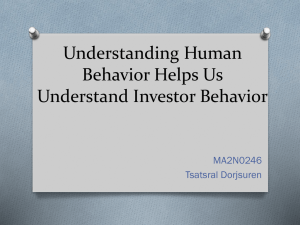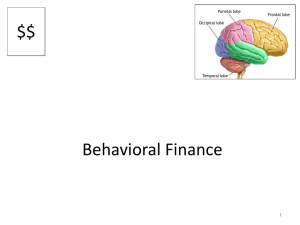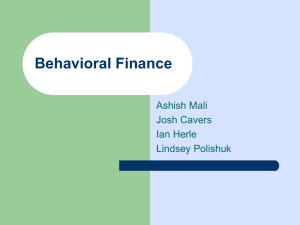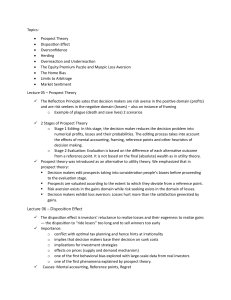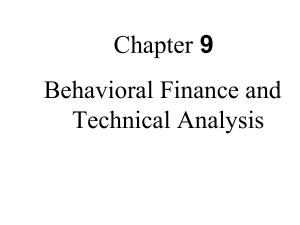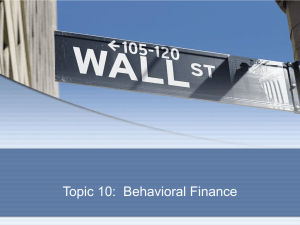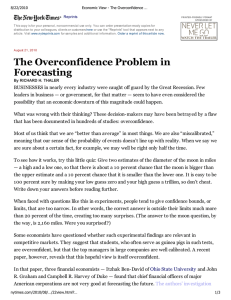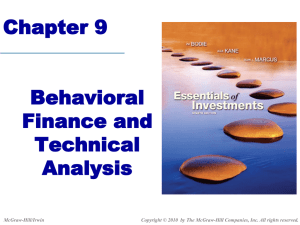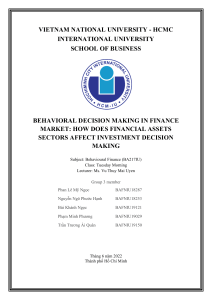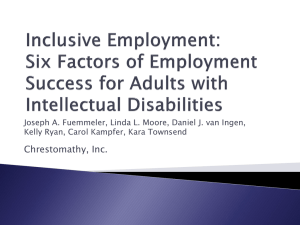Psychology and Behavioral Finance
advertisement
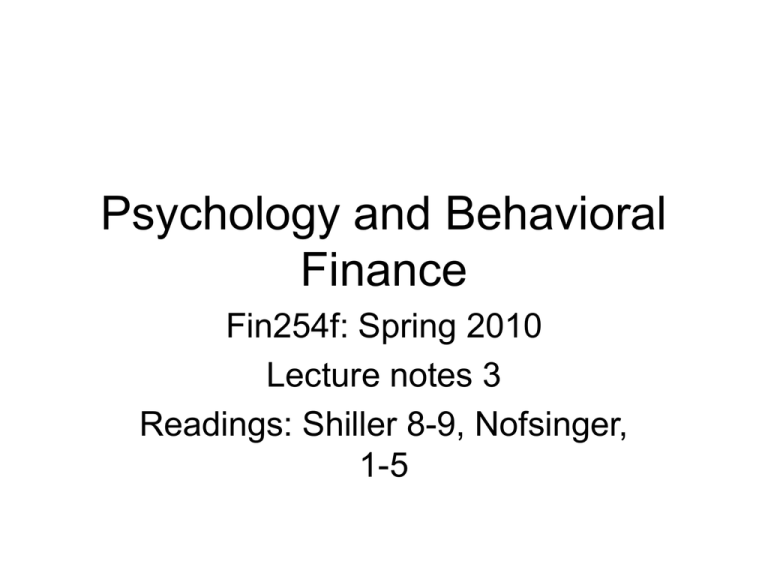
Psychology and Behavioral Finance Fin254f: Spring 2010 Lecture notes 3 Readings: Shiller 8-9, Nofsinger, 1-5 Outline What is behavioral finance? A list of behavioral features/quirks Herding behavior Does this all explain bubbles? Behavioral Finance Acknowledges that investors are not perfectly rational Allows for psychological factors of behavior Applies results from experiments on risk taking Behavioral Quirks We all make mistakes Laboratory experiments indicate that these can follow consistent patterns Questions About Quirks Do they apply in the real world (outside the laboratory)? Do they aggregate? Top Behavioral Issues for Finance Overconfidence Loss aversion/house money Anchoring/representativeness Regret Mental accounting Probability mistakes Ambiguity Herd behavior Overconfidence Driving surveys: 82% say above average New businesses Most fail Entrepreneurs believe 70% chance of success Believe others have 30% chance of success Investors believe they will earn above average returns Overconfidence and Investor Behavior Conjecture: Overconfident investors trade more (higher turnover) Believe information more precise than is Psychology: Men more overconfident than women Data: Men trade more than women Data: High turnover traders have lower returns (net transaction costs) Overconfidence and Risk taking Overconfident investors take more risk Higher beta portfolios Smaller firms Loss Aversion/House Money House More willing to risk recent gains Loss money aversion More risk averse after a recent loss General heavier weight on losses (not mean-variance) Difficulty : Aggregation Anchoring/ Representativeness Arbitrary value that impacts decision Information shortcut Quantitative anchor Representativeness/familiarity Current stock price, or recent performance Price of other stocks Loss aversion Story telling Qualities of good companies Own company/local phone companies/home bias Status Quo Bias (401K matching funds) Regret Pain from realizing past decisions were wrong Disposition Investors hold losers too long, and Sell winners too soon Evidence: Higher volume on recent winners, lower for losers Real estate: Sellers with losses set higher initial bid prices/ wait longer to sell Impact on bubbles? Regret “My intention was to minimize my future regret. So I split my contribution 50/50 between bonds and stocks.” Harry Markowitz Mental Accounting You can go on vacation. Would you like to pay for it with $200 month for the 6 months before the vacation $200 month for the 6 months after the vacation Probability Difficult for humans Conditional probabilities harder Information -> Decisions Uncertainty/ambiguity Probability Mistakes Medical tests DNA evidence Sports Game shows (Monty Hall) Linda is 31 years old, single, outspoken, and very bright. She majored in environmental studies. She is an avid hiker, and also participated in anti-nuclear rallies. Which is more likely? A.) Linda is a bank teller. B.) Linda is a bank teller and a member of Green Peace. Gambler’s Fallacy Law of Small Numbers Decisions Hot Hands Mutual funds Patterns Is made on short data sets seen in short data sets Technical trading this really irrational? Econometrics and regime changes “New Economy” Ambiguity: Risk and Uncertainty Risk: Know all probabilities Uncertainty: Probabilities are not known Knight/Ellsberg "Knightian uncertainty" Casinos versus stock markets Securitized debt markets Donald Rumsfeld on Ambiguity “Reports that say that something hasn't happened are always interesting to me, because as we know, there are known knowns; there are things we know we know. We also know there are known unknowns; that is to say we know there are some things we do not know. But there are also unknown unknowns — the ones we don't know we don't know.” Herding Group technologies News media Personal contacts Telephones (20’s) Internet (90’s) Investment clubs Investors watch what others our doing and investing in more than fundamentals Internet Stocks and Herding eToys versus Toys R Us Toys-R-Us Market value $6 billion Earnings $376 million eToys Market value $8 billion Earnings -$28 million, sales $30 million Experiments Asch experiments: obvious wrong answers (repeated with out physical proximity) Milgram and authority Candid camera elevators Information Cascades Restaurant A versus B Epidemics and information Does the right restaurant survive? Infection rate, removal rate Logistic curve Messy in finance and social systems (doesn’t work like a disease) Theory of mind Lot’s of hypotheses Narrow down to those others have Summary Humans often behave in somewhat irrational fashions Key questions remain Especially when uncertainty is involved Aggregation Bubbles Investment strategies Keep in mind: The real world is very complex
